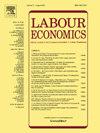拆解结构变化、服务化和技能偏向的变化
IF 2.6
2区 经济学
Q2 ECONOMICS
引用次数: 0
摘要
本文利用德国1975年至2017年的数据,分析了劳动力市场的三个关键趋势——结构变化、服务化和技能偏向化。通过分解分析,我们发现了它们对就业转移的个体影响,揭示了它们在德国劳动力市场演变中的独特作用。服务化和技能偏向变化与结构变化一起显著影响就业增长。例如,令人惊讶的是,结构性变化只占制造业失业的三分之二。进一步的分析揭示了跨任务、公司类型和地区的更详细的模式。本文章由计算机程序翻译,如有差异,请以英文原文为准。
Disentangling structural change, servitization, and skill-biased change
This paper analyzes three key labor market trends – structural change, servitization, and skill-biased change – using German data from 1975 to 2017. Through a decomposition analysis, we discern their individual impacts on employment shifts, revealing their distinct roles in the German labor market’s evolution. Servitization and skill-biased change significantly influence employment growth alongside structural change. Surprisingly, for instance, structural change accounted for only two-thirds of job losses in the manufacturing sector. Further analysis uncovers more detailed patterns across tasks, firm types, and regions.
求助全文
通过发布文献求助,成功后即可免费获取论文全文。
去求助
来源期刊

Labour Economics
ECONOMICS-
CiteScore
3.60
自引率
8.30%
发文量
142
期刊介绍:
Labour Economics is devoted to publishing research in the field of labour economics both on the microeconomic and on the macroeconomic level, in a balanced mix of theory, empirical testing and policy applications. It gives due recognition to analysis and explanation of institutional arrangements of national labour markets and the impact of these institutions on labour market outcomes.
 求助内容:
求助内容: 应助结果提醒方式:
应助结果提醒方式:


